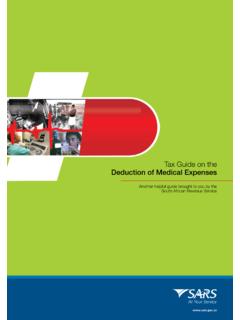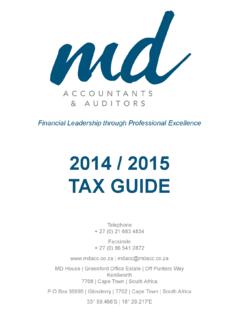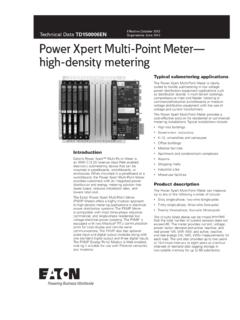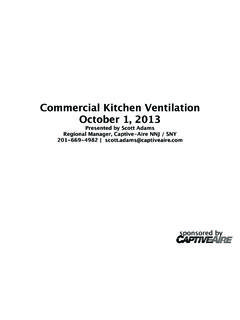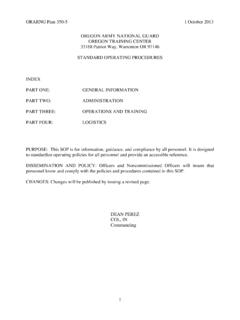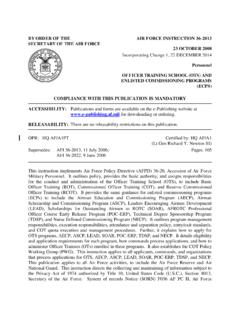Transcription of GUIDE ON THE RETENTION OF RECORDS - MD Acc
1 GUIDE ON THE. RETENTION OF RECORDS . Updated October 2013. COPYRIGHT 2013. THE SOUTH AFRICAN INSTITUTE OF CHARTERED ACCOUNTANTS. Copyright in all publications originated by The South African Institute of Chartered Accountants rests in the Institute. Apart from the extent reasonably necessary for the purposes of research, private study, personal or private use, criticism, review or the reporting of current events, as permitted in terms of the Copyright Act (No. 98 of 1978), no portion may be reproduced by any process without written permission. ISBN 978-0-86983-391-9. THE SOUTH AFRICAN INSTITUTE OF CHARTERED ACCOUNTANTS. P O BOX 59875, KENGRAY, 2100. Page 2 of 27. Table of Contents PREFACE .. 5. RETENTION OF RECORDS .. 6. Multiple legislative requirements .. 6. RETENTION of RECORDS for an indefinite period .. 6. 1 AUDITORS .. 8. Auditing Profession Act, No 26 of 2005 .. 8. 2 CLOSE CORPORATIONS .. 8. Close Corporations Act, No 69 of 1984.
2 8. 3 COMPANIES .. 9. Companies Act, No 71 of 2008 .. 9. 4 CONSUMER PROTECTION .. 10. Consumer Protection Act, No 68 of 2008 .. 10. 5 CREDIT AGREEMENTS .. 12. National Credit Act, No 34 of 2005 .. 12. 6 ELECTRONIC COMMUNICATION .. 14. Electronic Communication and Transaction Act, No 25 of 2005 .. 14. 7 FINANCIAL ADVISORY AND INTERMEDIARY SERVICES .. 15. Financial Advisory and Intermediary Services Act, No 37 of 2002 .. 15. 8 FINANCIAL INTELLIGENCE .. 16. Financial Intelligence Centre Act, No 38 of 2001 .. 16. 9 HEALTH AND SAFETY .. 17. Compensation for Occupational Injuries and Diseases Act, No 130 of 1993 .. 17. Occupational Health and Safety Act, No 85 of 1993 .. 18. Page 3 of 27. 10 INSOLVENCY AND LIQUIDATION .. 19. Insolvency Act, No 24 of 1936 .. 19. 11 LABOUR 20. Basic Conditions of Employment Act, No 75 of 1997 .. 20. Employment Equity Act, No 55 of 1998 .. 20. Labour Relations Act, No 66 of 1995.
3 21. Unemployment Insurance Act, No 63 of 2002 .. 22. 12 STATE-OWNED 23. Public Finance Management Act, No 1 of 1999 .. 23. Municipal Finance Management Act, No 56 of 2003 .. 24. 13 TAX .. 25. Tax Administration Act, No 28 of 2011 .. 25. Income Tax Act, No 58 of 1962 .. 26. Value Added Tax Act, No 89 of 1991 .. 27. Page 4 of 27. PREFACE. This GUIDE has been issued by The South African Institute of Chartered Accountants' (SAICA's). Legal Compliance Committee (LCC). The GUIDE seeks to inform members of the requirement to retain documents for a certain time period. Every effort has been made to ensure that where quotes, extracts and paragraphs from legislation are referred to these references are correct. The information contained in the GUIDE is for information purposes only. Every effort has been made to ensure that the advice given in this GUIDE is correct. Nevertheless, that advice is given purely as guidance to members of SAICA to assist them with particular problems relating to the subject matter of the GUIDE , and SAICA will have no responsibility to any person for any claim of any nature whatsoever that may arise out of, or relate to, the contents of this GUIDE .
4 Page 5 of 27. RETENTION OF RECORDS . Owing to various legislative requirements, documents must be retained for a certain number of years, depending on the legislation. This GUIDE refers to the legislation and identifies the timeframe in which certain documents have to be kept. The GUIDE does not attempt to include all legislation, but only refers to the general legislation that impacts on a wide variety of entities. The GUIDE has been compiled to assist SAICA members to meet the legislative requirements when they deal with clients. The GUIDE is structured to refer to the relevant Act and then to the documents that should be kept and to the period of RETENTION . Multiple legislative requirements Where different legislation refers to the RETENTION of the same RECORDS /information, business must consider adhering to the most stringent of the legislative requirements. For example the Value Added Tax Act states that invoices should be kept for 5 years from the submission of the return.
5 However, the Companies would require the financial RECORDS to be kept for a minimum of 7 years and therefore the company should adhere to the most stringent requirement of 7 years. Where legislation refers to different RECORDS ( employment RECORDS versus accounting RECORDS ), then each requirement is specific to that legislation and should be applied accordingly to the specific RECORDS . It is important to note that the Companies Act, No 71 of 2008, has a general requirement, in respect of any information that a company is required to keep (whether in terms of the Companies Act or any other legislation), to retain such information for a period of at least seven years (or the longer period specified in the applicable legislation). Therefore, companies should ensure that company RECORDS and information are retained for no less than seven years. The Protection of Personal Information Bill (B9D) has been approved by Parliament, but at the date of the publication of the GUIDE had not yet been signed by the President.
6 It is important to be aware that section 14 of the Protection of Personal Information Bill states that personal information must not be retained for any longer than is necessary to achieve the purpose for its collection. If there is no legal requirement to keep the information, it should be deleted. The Bill therefore places an obligation on the person collecting the data to delete or remove it at a certain time. RETENTION of RECORDS for an indefinite period In certain instances, legislation requires that RECORDS be kept for an indefinite period. The term indefinite is not defined in the legislation, but clearly requires that documents be retained for as long as the relevant entity exists. We note, however, that once an entity ceases to exist, the obligation on that entity to retain documents indefinitely also ceases to exist. In the case of a company, for example, the obligation to retain documents in terms of the Companies Act, No 71.
7 Of 2008, only applies to an entity that remains registered as a company. Page 6 of 27. After an entity ceases to exist, other legislation may require RECORDS to be retained, but typically only for a period of time and no longer indefinitely . In the case of liquidation or sequestration in terms of the Insolvency Act, No 24 of 1936, specific requirements apply to the RETENTION of documents, discussed under Section 10 Insolvency and Liquidation below. As a company that has been deregistered can be re-registered, or litigation may follow in respect of the deregistered company, we propose that the RECORDS of a deregistered company be retained for a reasonable period after deregistration (we propose no less than three years). Page 7 of 27. 1 AUDITORS. Auditing Profession Act, No 26 of 2005. The Auditing Profession Act, No 26 of 2005, implicitly requires that documents should be retained for three years.
8 Section 47 requires the regulatory board, or any person authorised by it, to inspect or review the practice of a registered auditor at least every three years. The International Standard on Quality Control (ISQC 1) paragraph A61 specifically requires the RETENTION period for audit engagements to be no shorter than five years from the date of the auditor's report, or, if later, the date of the group auditor's report. Document RETENTION period Reference: ISQC 1, para A61. Working papers, statements, correspondence, books or other 5 years after documents in the possession or under the control of a registered completion of the auditor audit 2 CLOSE CORPORATIONS. Close Corporations Act, No 69 of 1984. The Close Corporations Act, No 69 of 1984, has the goal of providing for the management, control and liquidation of close corporations. The Administrative Regulations identify the various periods that documents relating to the Close Corporation must be retained.
9 Document RETENTION period Schedule 3 amended by Government Notice R1664 of 1982. Accounting RECORDS , including supporting schedules to 15 years accounting RECORDS and ancillary accounting RECORDS Amended Founding statement (forms CK 2 and CK 2A) Indefinite Annual financial statements, including annual accounts and the 15 years report of the accounting officer Founding statement (Form CK 1) Indefinite Microfilm image of any original record reproduced directly by the Indefinite camera the camera master . Minutes books as well as resolution passed at meetings Indefinite Page 8 of 27. 3 COMPANIES. Companies Act, No 71 of 2008. The Companies Act, No 71 of 2008, consolidates and amends the law that relates to companies. This Act became effective on 1 May 2011 and should be read with the Companies Amendment Act, No 3 of 2011, and the Companies Regulations, 2011. The Act expressly provides that RECORDS must be kept in written form, or other form or manner that allows that information to be converted into written form within a reasonable time.
10 Document RETENTION period Reference: Section 24. General rule for company RECORDS : Any documents, accounts, 7 years or longer books, writing, RECORDS or other information that a company is (as specified in required to keep in terms of the Act and other public regulation other public regulation). Registration certificate Indefinite Memorandum of Incorporation and alterations or amendments Indefinite Rules Indefinite Securities register and uncertificated securities register Indefinite Register of company secretary and auditors Indefinite Regulated companies (companies to which chapter 5, part B, C Indefinite and Takeover Regulations apply) - Register of disclosures of person who holds beneficial interest equal to or in excess of 5%. of the securities of that class issued Notice and minutes of all shareholders meeting including: 7 years - Resolutions adopted - Document made available to holders of securities Copies of reports presented at the annual general meeting of the 7 years company Copies of annual financial statements required by the Act 7 years Copies of accounting RECORDS as required by the Act 7 years record of directors and past directors, after the director has 7 years retired from the company Written communication to holders of securities 7 years Minutes and resolutions of directors' meetings, audit committee 7 years and directors' committees Page 9 of 27.
